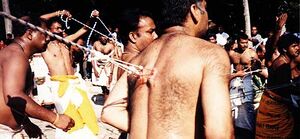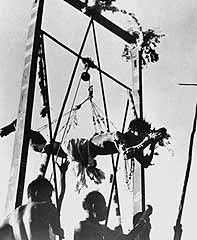Tamil Nadu
Jump to navigation
Jump to search
The Savite Hindus are a religious sect of Hinduism also found in western Malaysia, northern Sri Lanka, and in Tamil Nadu, a state in the southern tip of India. The group is known for their ritualistic piercing and suspensions.
Fakir Musafar writes in his article series for BME:
- Two major Hindu Festivals are especially focused on body piercing rituals: Thaipusam in January/February and Chidi Mari in May/June. Both festivals are celebrated primarily by Savite Hindus (devotees of Lord Siva, Muruga, Murugan, Subramanya, the Great Mother Mari and Kali). Other Hindus, like the followers of Vishnu or Krishna, do not usually practice body rituals or employ body piercing in their religious practice. In fact, they often hold these rites in contempt. The Savites are mostly the dark-skinned Tamil people of Southern India (Tamil Nadu) and direct descendents of the original indigenous peoples of India. Their Tamil language used in the chants of their “Pujas” (worship) is the spoken equivalent of the ancient written language of Sanskrit. Historically, the Tamil peoples have been persecuted for hundreds of years. First by the light-skinned Northern Indians, descendents of Aryan invaders, then by the British colonialists who hauled them off as virtual slaves to work on tea plantations in Ceylon (now Sri Lanka) and other parts of the British Empire. Wherever they’ve been taken by force, the Tamil people have been remarkably successful in preserving their culture and spiritual practices...
- As public festivals, both the Thaipusam and Chidi Mari have been effectively outlawed in India and Sri Lanka. Too barbaric. But in other parts of Southeast Asia, especially Malaysia and Thailand, these “torture festivals” still flourish. The Chidi Mari Festival is devoted to worship of the “Great Mother” (Mari) and other female deities like Kali. Devotees are often pierced by two hooks in the back, suspended on the end of a long pole and rotated high in the air. Others are pierced with multiple hooks and suspended horizontally for long periods of time (two to six hours). All this done to attain a “State of Grace” (ecstatic trance) in which the Great Mother possesses their bodies and bestows enlightenment and blessings on them and their families.
- Thaipusam is a piercing festival to Lord Siva and especially the Hindu dieties who are “Stars in His Crown”: Muruga, Murugan, Subramanya, Skanda, Ganapati. Devotees vow to bear a gift to the deity (archtype) under physical hardship. This is considered the purest of gifts — the offering of one’s own body pierced with spears, skewers or hooks as it delivers the gift. This is “Worship Through the Body” and such a gift is especially accepted and blessed by such deities (archetypes) as Murugan, Lord of Piercing and patron Saint of the Tamils. When I witnessed the Thaipusam in Penang Malaysia in 1995, I felt the reality of the sacrificial energy released. It was overpowering, intoxicating, sweet, and very similar to the energy that I have experienced at many of the body suspension and hook pulling rituals I have facilitated or witnessed in recent years.[1]
Sources
- [1] Fakir Musafar's article Suspensions & Tensions I: Yesterday on BME News

